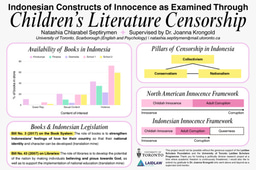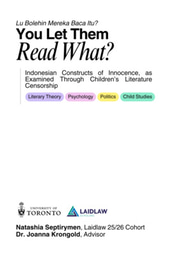Research Reflection: "To love the stuff and the language, but to hate the country"
“How strange,’ said Ramy. ‘To love the stuff and the language, but to hate the country.’
‘Not as odd as you’d think,’ said Victoire. ‘There are people, after all, and then there are things.”
— R.F. Kuang (Babel, or the Necessity of Violence)
I hesitated for a very long time on what I should center my Laidlaw project around. It wasn’t because I was unsure of what topic I wanted to write about. Rather, I wondered whether it was my place at all to write about censorship in Indonesia because, by many objective measures, I am not very Indonesian.
By blood, I am likely more Chinese than Indonesian. I wasn’t born in the country. I couldn’t speak Indonesian without an exceedingly North American accent until very recently. Even if I spent most of my life in Indonesia, I still do not dream in Indonesian. I am not part of the majority religion, nor do I believe in any God. Despite having only been in Canada for 2 years, people almost always assume that I’m local. These assumptions aren’t unfounded either: I am fully aware of the accent I speak English in, of my westernized mannerisms, of the ideals I hold that many older Indonesians would dismiss as Western propaganda.
I also hesitated to write about a topic that was so heavily centered on queerness and the silencing of queer narratives, mostly because I feared I would not be able to do it justice as someone who isn’t queer. I constantly wondered if it was my place to talk about the disenfranchisement of queer voices in Indonesia, because I have never experienced even a fraction of the pain that has been inflicted upon the queer community in Indonesia. Many times, I wondered if I could write this paper with the nuance that the community deserves.
On the other hand, of course, there was also fear. It would be presumptuous of me to assume that my work will gain any mainstream traction, but if a singular homophobe from high school decides to tell their diplomat parents about my paper, there could be no shortage of social consequences. In my paper, I advocate unquestionably for the freedom to read queer literature. I criticize my own government for their obsession with appeasing conservative religious groups. I speak out against their normalization of violence and hatred towards minorities. The Indonesian government is unlikely to come for me, but I do realize that I will likely be losing many connections and opportunities in Indonesia if my paper becomes widely shared.
I also recognize the irony in this reflection. I write with some sadness about how I don’t feel Indonesian enough for this project, yet I turn around and criticize the country and its norms within the same breath. Many older Indonesians would take my research as a sign that I have abandoned my nationality, and that “Western wokeism” has taken over my mind. However, I firmly believe that the values of equality, human rights, and acceptance are not inherently Western concepts, and should never be labelled as such. I refuse to believe that advocating for the universal concept of empathy strips me of my Asianness.
I choose to criticize my society and its norms precisely because I am proud of being Indonesian. I dream of an Indonesia where queer rights exist, where the freedom to read and write is championed, where religious freedom for all is the norm, especially for those who do not believe, and for religious minorities who have been silenced. Religious conservatism, purity culture, and hatred are not qualities that are inherent to my country and my people; it is a belief system built by the historic failures of our government and our colonizers. This belief system can still be shifted, to be shaped and molded into a system that is more empathetic and generous.
Though I talk about my research confidently, I still inevitably have doubts about whether I am the right person to talk about this topic. I know I have done my best to research this topic with the nuance and rigor it deserves, but some things may still inevitably fall through the cracks. This is something I have made peace with, and I hope that those who are more knowledgeable in the topic will continue critiquing my work and providing me feedback where I fall short.
I do know that I hold a lot of privilege in being able to research this topic as an Indonesian. I suspect that this topic remains under researched in the country because the social repercussions on the researcher and their institution would be too heavy. Despite all my concerns, I am lucky to know for sure that my closest friends and family will not cut me off because of this research topic. I am lucky to be attending an institution that funds politically divisive research, especially at a time where research is continuously getting defunded. I am lucky that I was raised to be loud and disruptive, to speak up when something is wrong. There are many privileges that made this research possible; it would be a disservice if I did not advocate proudly.



Please sign in
If you are a registered user on Laidlaw Scholars Network, please sign in